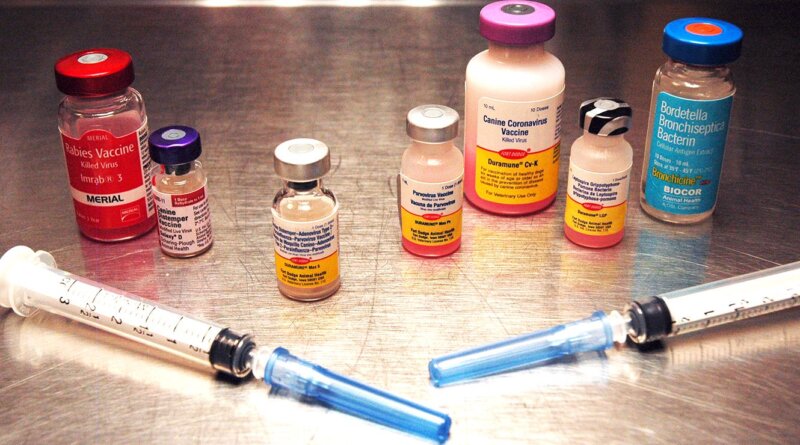Dog Behavior Change After Vaccination
Your dog just had his annual wellness exam and earned a clean bill of health. He also received vaccinations at that visit. Now your normally happy, playful pup just wants to sleep, is acting a little grouchy, and declined to eat his food. What happened?
Dogs can feel a little under the weather after receiving a vaccine. They may experience lethargy, a reduced appetite, pain or swelling at the vaccine injection site, or a low-grade fever. This is very similar to how many of us feel after being vaccinated. These side effects typically resolve within a day, but some dogs may experience these symptoms for up to three days after receiving a vaccine.
Some dogs may act weird or exhibit a temporary behavior change after receiving a vaccine. They may want to be left alone or might try to nip at someone that touches the site where the vaccine was administered. Think about the last time you or someone you knew got a vaccine in the arm; that spot is sore and tender for a few days. Dogs feel the same way but cannot say, “Hey! Don’t touch me there!”, so they may hide or nip.
Allergic reactions to vaccination
Lethargy, reduced appetite, and soreness are expected vaccine side effects. But a vaccine reaction – also referred to as an allergic reaction – is rare and always abnormal. Symptoms of a vaccine reaction include vomiting, diarrhea, facial swelling, hives, and severe coughing or difficulty breathing.
A vaccine reaction can occur in the first few minutes to a few hours after receiving a vaccine. Always seek immediate veterinary care if you think that your dog is experiencing a vaccine reaction.
The cause of a vaccine reaction is typically an allergy to one or more proteins used in the vaccine manufacturing process. For example, one method for manufacturing the influenza vaccine for humans is to grow the influenza virus in chicken eggs. These vaccines may contain a small amount of an egg protein called ovalbumin. This is why you may be asked if you are allergic to eggs before receiving the flu shot. If you answer “yes,” then you may be given a flu shot in which eggs were not used in the manufacturing process.
The same can be true for our dogs. Some canine vaccines are manufactured using fetal calf serum. These vaccines may contain trace amounts of bovine albumin, gelatin, and casein. A dog who is allergic to any of these proteins may experience an allergic reaction when given one of these vaccines.
How to minimize the risk of adverse events
If your dog experiences a vaccine reaction or is really bothered by vaccine side effects, here are some things you and your veterinarian can do to safely vaccinate your dog:
- Consider giving no more than two vaccines at one visit, and separate vaccine visits by at least two weeks. Small and toy breed dogs and dogs who are unusually sensitive to vaccines may benefit from only receiving one vaccine per visit.
- Dogs who have experienced a vaccine reaction may benefit from receiving an injection of diphenhydramine (Benadryl) with or without an injection of a short-acting steroid (like dexamethasone) just prior to receiving a vaccine.
- Since most vaccine reactions are caused by an allergy to proteins in vaccine growth medium, talk to your veterinarian about using an ultra-purified vaccine or a recombinant vaccine. Ultra-purified vaccines are taken through an additional purification process to remove more of the proteins that may cause an allergic reaction. Recombinant vaccines do not require a growth medium and are less likely to contain stabilizer proteins to which a dog may be allergic.
- You may think that giving only one-half the vaccine dose will minimize the risk of experiencing side effects. But the only thing this will do is provide your dog with inadequate protection against the disease being vaccinated against. Never give less than the manufacturer’s recommended dose of a vaccine.
Experiencing one or more vaccine side effects or having a vaccine reaction is not a reason to discontinue vaccinating your dog. Vaccines are an effective tool for preventing serious and sometimes fatal diseases. Talk to your dog’s veterinarian about the best vaccination plan for him.
Sidebar: How do vaccines work?
Your dog’s immune system (and yours, too!) is a sophisticated defense network that recognizes and neutralizes invaders that can cause disease, such as viruses and bacteria. The immune system has two parts: the innate system (also known as the general system) and the adaptive system (also known as the specialized system).
The innate immune system is the first line of defense but can only differentiate between friend and foe. The adaptive immune system is the second line of defense. It takes the time to learn about an invader and develop a strategy for neutralizing it. And it stores information about the invader should it ever enter your dog’s body again.
Before vaccines, the only way that the adaptive immune system could learn about its enemies was to be exposed to them through natural infection. This meant becoming ill with a disease – ideally, without dying – so that immunity could be developed by the adaptive immune system.
A vaccine introduces the adaptive immune system to a bacteria, virus, or toxin so that it can learn how to recognize that specific invader. Think of vaccines as training films for the immune system – like “Don’t take candy from strangers!”
Most vaccines are given as a series of two shots. The first vaccine shows the adaptive immune system how to recognize the invader. The second vaccine is like a simulation; it trains the adaptive immune system to make and store memories about the invader without launching an attack. If and when the real invader enters your dog’s body, the adaptive immune system will recognize and neutralize the virus or bacteria, preventing your dog from getting sick.



